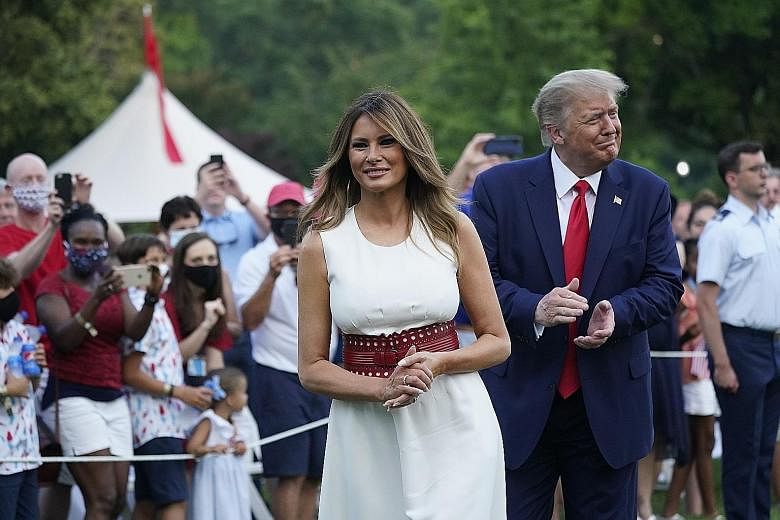WASHINGTON • US President Donald Trump used the spotlight of the Fourth of July weekend to sow national divide during a nationwide crisis, denying his failings in containing the worsening coronavirus pandemic while delivering a harsh diatribe against what he branded the "new far-left fascism".
In a speech at the White House last Saturday evening and at an address in front of Mount Rushmore last Friday night, Mr Trump promoted a version of the "American carnage" vision for the country that he laid out during his inaugural address - updated to include an ominous depiction of the current protests over racial justice.
In doing so, he signalled even more clearly that he would exploit race and cultural flashpoints to stoke fear among his base of white supporters in an effort to win re-election.
As he has done in the past, he resorted last Friday to exaggerated, apocalyptic language in broadly tarring the nationwide protests against entrenched racism and police brutality, saying that "angry mobs" sought to "unleash a wave of violent crime in our cities" and that those seeking to deface monuments want to "end America".
Mr Trump followed up with his remarks last Saturday from the South Lawn of the White House, which sounded more like a campaign rally, and repeated the themes from the previous evening.
"We will never allow an angry mob to tear down our statues, erase our history, indoctrinate our children or trample on our freedoms," the President said, claiming that protesters - who have won broad public support, including from corporate America - were "not interested in justice or healing".
Mr Trump cast himself as the heir to "American heroes" who defeated Nazis, fascists, communists and terrorists, all but drawing a direct line from such enemies to his domestic critics. "We are now in the process of defeating the radical left, the Marxists, the anarchists, the agitators, the looters and people who in many instances have absolutely no clue what they are doing," he said.
Speaking to an audience that included front-line workers such as doctors and nurses fighting the coronavirus, Mr Trump boasted about his administration's response, even as more than 132,000 Americans have died from Covid-19 and cases are surging in parts of the country.
Local officials had urged the White House to cancel the Independence Day celebration, citing public health concerns, and few on the White House South Lawn were wearing masks, a safety precaution Mr Trump and his administration have consistently played down.
The President repeated his false claim that an abundance of testing made the country's cases look worse than they were because they "show cases, 99 per cent of which are totally harmless".
And he raised expectations for a vaccine "long before the end of the year". It was his latest attempt to dismiss widespread criticism of his administration's slow and ineffective response to the coronavirus.
His remarks at Rushmore, and repeated from the grounds of the White House, were a reflection of his dire political standing as he nears the end of his first term in office.
Mr Trump is trailing former vice-president Joe Biden, the presumptive Democratic nominee, in national and battleground polls; lacks a booming economy or a positive message to campaign on as he tries to assign blame elsewhere for the spread of the coronavirus; and is leaning on culture wars instead to buoy his base of white supporters.
Campaign officials said last Saturday that they thought the speeches struck the right note for the moment.
These officials have repeatedly said they expect a backlash against the progressive "cancel culture" movement to help the President's standing with white suburban female voters, who they believe to be frightened by images of chaos in city streets. But that backlash has yet to reveal itself in polls.
A recent New York Times/Siena College survey showed that 75 per cent of moderates and even 53 per cent of somewhat conservative voters have a favourable opinion of Black Lives Matter.
Private Republican polling indicates Mr Trump is slipping in red states, in large part because conservative-leaning voters are unsettled.
Mr Patrick Murray, director of the Monmouth University Polling Institute, said that past presidents have typically sought to diffuse cultural battles, "giving people this amorphous kind of middle where they can continue to live".
Mr Trump, however, is unlike any of his predecessors. "Donald Trump does not give you that choice - you are either with him or against him," said Mr Murray, whose latest survey this past week showed Mr Biden leading 53 per cent to 41 per cent.
"He is forcing people to take sides. And when they take sides, more of them are moving to the other side."
NYTIMES

